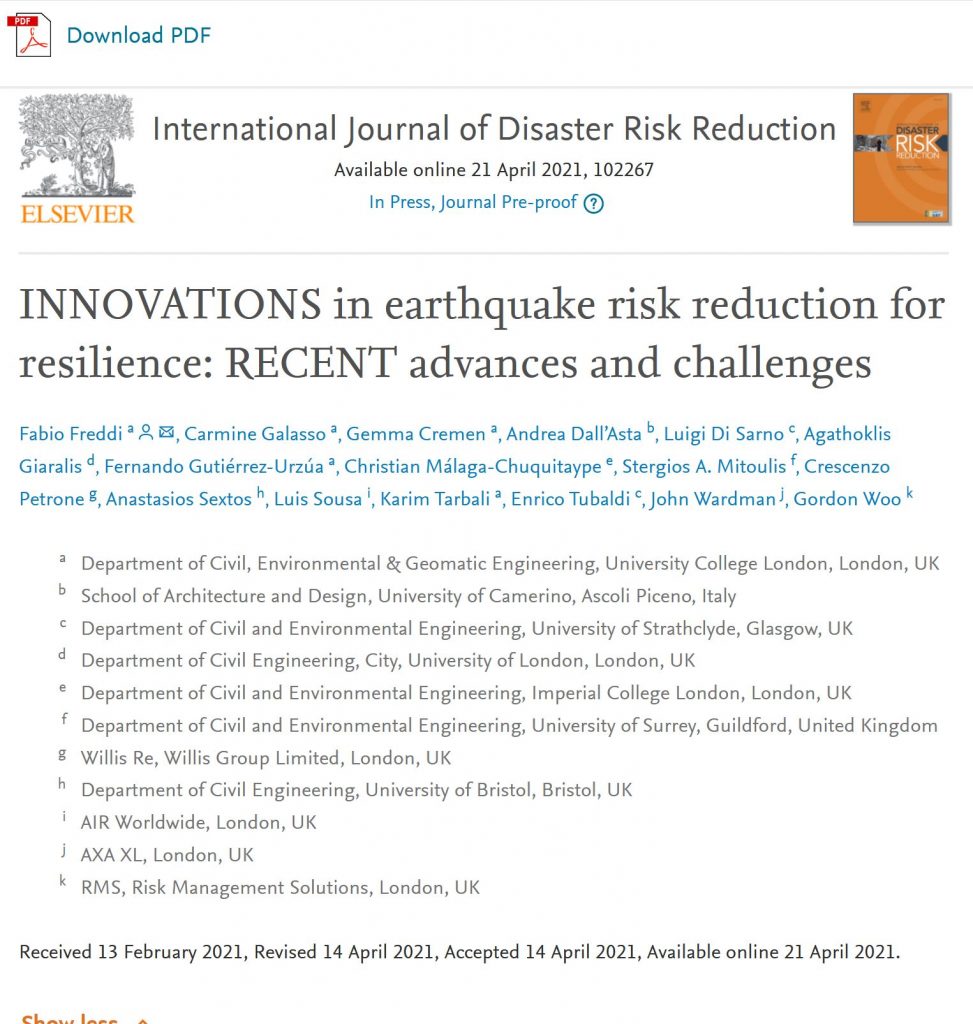Here you will find news relevant to the activities of the initiative including webinars, talks, consulting projects, publications, participation in conferences and meetings mostly relevant to resilience of critical infrastructure with emphasis on transport and energy assets and their intra/interdependencies, views on the UNs Sustainable Development Goals and use of digital and emerging technologies in infrastructure risk-based management
12
Jul 22
€2.5million of funding secured from Horizon Europe HORIZON-MISS-2021-CLIMA-02
Our project was successful, a multidisciplinary and multipartner project with 18 partners.
Title:
RISKADAPT- Asset-level modelling of risks in the face of climate-induced extreme events and adaptation
RISKADAPT will provide, in close cooperation with the end-users & stakeholders, a novel, integrated, modular, interoperable, public and free, customizable user-friendly platform, to support systemic, risk-informed decisions regarding adaptation to climate change induced compound events at the asset level, focusing on the structural system. RISKADAPT will explicitly model dependencies between infrastructures, which, inter alia, will provide a better understanding of the nexus between climate hazards and social vulnerabilities and resilience. Moreover, this project will identify gaps in data and propose ways to overcome them, and advance the state of the art of asset-level modelling through advanced climate science to predict climate change forcing on the structure of interest, structural analyses, customized to the specific structure of interest, that consider all major climate change induced load effects in tandem with material deterioration, novel probabilistic environmental life cycle assessment (LCA) and life cycle cost (LCC) of structural adaptation measures and a new model to assess climate risk that will combine technical risk assessment with an assessment of social risks.
This is of particular interest to me as the landmark Polyfytos Bridge will be one of the main case studies of this project and we will try to identify optimised adaptation strategies leading to minimum social impacts for the local community.
Leader: RISA Germany
The project is in support of climate change adaptation, adaptation, resilience, sustainability, net-zero and digitalisation
6
Jul 22
The Thorpe Medal was awarded for our research paper
The infrastructuResilience was awarded the 2022 European Council on Computing in Construction (EC3) Thorpe Medal, for our paper:
Argyroudis, S.A., Mitoulis, S.A., Chatzi, E., Baker, J.W., Brilakis, I., Gkoumas, K., Vousdoukas, M., Hynes, W., Carluccio, S., Keou, O., Frangopol, M.D. and Linkov, I. (2022) “Digital technologies can enhance global climate resilience of critical infrastructure,” Journal of Climate Risk Management, 35,
You can download the paper for free here.
It’s an open-access paper and accessible to general audiences and sets an agenda for data-driven resilience and sustainability assessments in critical infrastructure.
The award (https://lnkd.in/etzXTBRD) was instituted and endowed in 2018 in the honour of Prof Antony Thorpe, a pioneering professor in construction information technology and co-founder of COMIT the community for mobile #computing in construction, and it is awarded in recognition of a paper that contributes to either practical or research aspects of engineering informatics disciplines in the built environment. The practical value of contribution and its impact on engineering informatics practice are key evaluation criteria.
5
Jul 22
Research grant – 1.6m Euros from HORIZON to consolidate resilience and sustainability in our infrastructure
ReCharged – Climate-aware Resilience for Sustainable Critical and interdependent Infrastructure Systems enhanced by emerging Digital Technologies. Funder: HORIZON-MSCA-SE-2021
New funding received from Horizon Europe:
Our €1.6m project was successful with a 97%, see details below.
Facts:
12 partners, 35 colleagues from 10 countries led mainly by women in engineering, 5 industrial partners, 6 universities and research and technology centres.
Brief description:
ReCharged has the vision to develop an integrated framework toward a practical visualisation platform in order to optimise and streamline climate resilience and whole-life carbon emission assessments for interdependent Transport and Energy Systems, Lifelines and Assets. We do that by harnessing the power of digital technologies and data to quantify the functionality and recovery of infrastructure. To achieve this, we will train people through research, innovation, and dissemination activities of interdisciplinary and inter-sectoral exchanges. ReCharged will facilitate the decision-making of operators, make people feel safer and augment researchers’ skills and career perspectives.
Special thenks to Dr Sotirios Argyroudis and Igor Linkov for their input
24
Mar 22
We won an MSCA-PF-2021 Fellowship
We won a Marie-Sklowdowska Curie research project (MSCA-PF-21) which will aim to facilitate infrastructure digitalisation and data driven resilience modelling:
title: DiRect – DIgitally-enhanced REsilience of Critical Transport infrastructure
A few words for this project:
DiRect will establish a streamlined, openly available, web-based toolkit for the integrated use of emerging advanced technologies towards urgently needed recovery models and adaptation paths to incentivize civil infrastructure resilience against multiple natural hazards exacerbated by climate change. This original approach of resilience will transform current approaches and strategies for monitoring infrastructure, by integrating heterogeneous data into model updating for achieving reliable and swift assessments. Advanced numerical modelling, fragility and recovery model development, as well as in applications of Geographic Information Systems GIS, Remote Sensing and Infrastructure Monitoring, the research output of DiRect will be calibrated based on a carefully selected case study, involving the performance and recovery of representative critical infrastructure in the recently devastated Bad Neuenahr-Ahrweiler region of Germany, following the pivotal flooding event of July 2021. The proposed toolkit can be used by public-and-private sector stakeholders for rapid decision-making and risk-informed management of similar critical infrastructure systems exposed to multiple natural hazards.
10
Feb 22
“Its not in our backyard” problems dramatically disproved by climate change
Medicane Ianos – the Mediterranean Hurricane said to be formed due to climate change – has very recently caused extensive damage and devastation in Greece. To date, we had very little information regarding the intensity of this unprecedented natural disaster that was manifested with sequential flash floods having a knock-on effect on the regional infrastructure leading to the devastation of vulnerable communities.
And like as if this was not enough, a few months later an earthquke stroke the same area to bitterly prove that multihazard natural disasters are there to stay, agonise people and mock scientific models.
When I was writing a paper one year before, in 2020, on multihazard resilience of infrastructure (see https://lnkd.in/dCpzTBX7) in the Science of Total Environment I was thinking “a flood and an earthquake – this is a very unlikely scenario – not in our backyard” but I was terribly wrong! This happened one year later and very limited access was possible to the devastated area, due to another -health this time- hazard COVID19, with draconian travel restrictions.
Perhaps if it wasn’t for Marianna Loli, the paper “Flood characterization based on forensic analysis of bridge collapse using UAV reconnaissance and CFD simulations”
would have never been published and we would have just witnessed this disaster without knowing “why this happened”. But it takes an engineer with perseverance, a forensic investigation, emerging technology (UAV-photogrammetry), and advanced engineering modelling to find out the cause of such a catastrophe. And if this happens again, we have pointclouds of the critical assets to swiftly make decisions and reinstate the functionality of the infrastructure but -most importantly- help the local communities to bounce back normality and make them feel safer and happier.
Paper is available online, free download here until the 31st of March: https://lnkd.in/eG3ayGz6
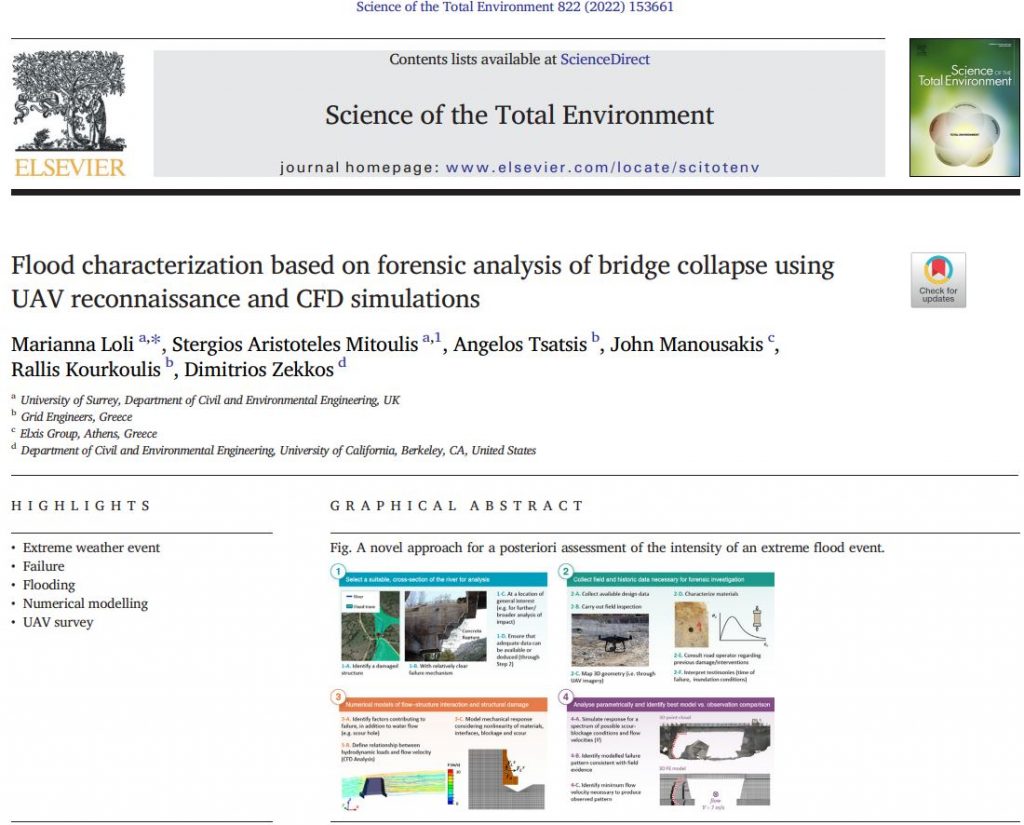
23
Dec 21
New paper on climate resilience of critical infrastructure incentivised by digital technologies and data
In our agenda-setting paper that is just published in the journal of Climate Risk Management we argue that:
“Digital technologies can enhance climate resilience of critical infrastructure”
to boost economic growth and societal well-being for achieving the United Nations Sustainable Development Goals (sdgs2030). Deployment of emerging digital technologies, underpinned by multi-stakeholder alliances, is essential for accelerating progress toward more resilient infrastructure to contain and recover from multiple hazards in a sustainable manner.
see more here
This multidisciplinary research paper is co-authored with colleagues from 5 different countries with contributions from policymakers, economic organisations, financial institutions, academics, consultants, data-analysts & R&D Centers.
Co-authors: Dr Sotirios Argyroudis, Prof Eleni Chatzi, Prof Jack Baker, Prof Ioannis Brilakis, Prof Konstantinos Gkoumas, Prof Michalis Vousdoukas, Prof William Hynes, Dr Savina Carluccio, Oceane Keou, Prof Dan Frangopol, Dr Igor Linkov
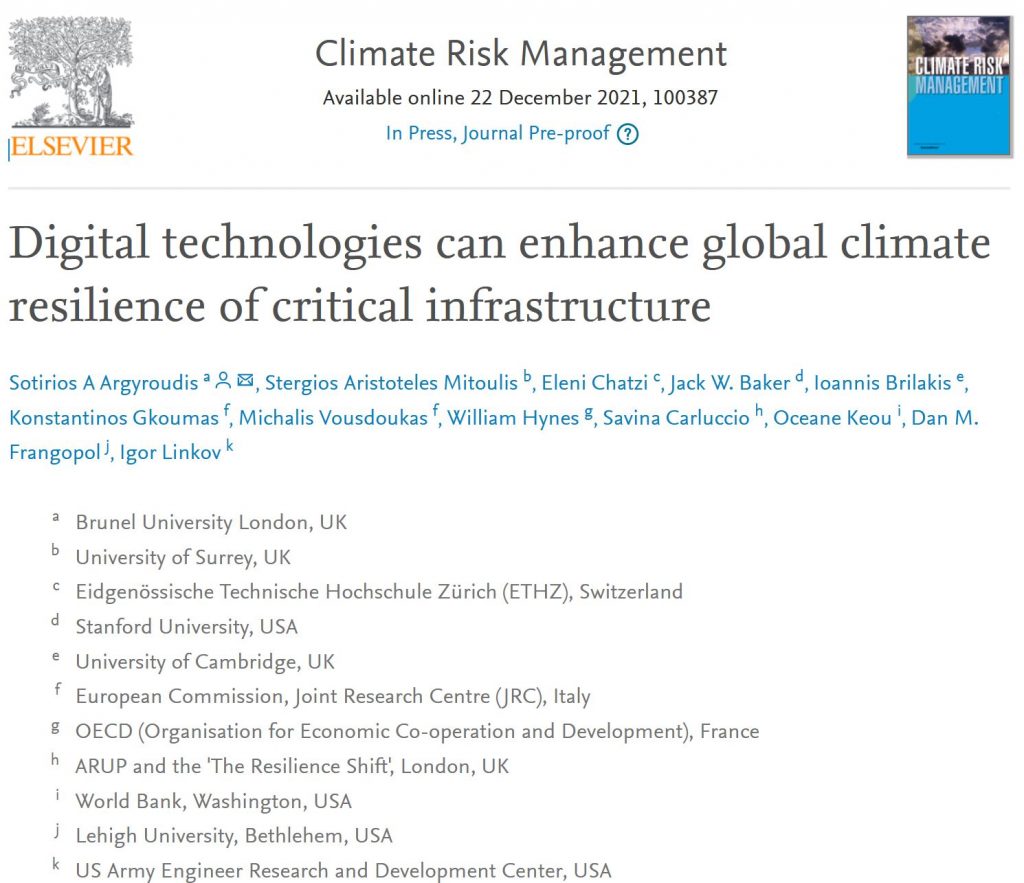
12
Nov 21
Challenges and future directions in improving bridge flood resilience
The conversation on our paper titled: Challenges and future directions in improving bridge flood resilience (includes aspects of climate adaptation climate change) is now open from the EGU and Copernicus Journal: Natural Hazards and Earth System Sciences, (NHESS)
Co-authors: Tubaldi E, Patelli E, White C, Mitoulis SA, de Almeida G, Cranston M, Brown J, McDonald H, E Koursari, Hardmang M, Mathews R, Newell R, Pizarro A, Roca M, Zonta D (2021). Invited perspectives: Challenges and future directions in improving bridge flood resilience, Nat. Hazards Earth Syst. Sci. Discuss (NHESS) [preprint], https://doi.org/10.5194/nhess-2021-293, (in review). Please click here to post comments and start the conversation:
The Journal has a cool capability that notifies everyone involved in the discussion of the paper when a new comment is posted and/or answered online. Have your say and voice your ideas and comments before it’s published!
(Note: you will need to register and become a user to participate to the conversation.
24
Oct 21
Data-driven decision making with coupled engineering, satellite imagery and digital twining
To combat adverse and changing environments and deliver robust and well-informed resilience frameworks, aware of the impacts of climate change on our critical infrastructure we need to embrace digital data, forensics and evidence from engineering inspections and openly available data and evidence from satellite imagery (see e.g. Copernicus Open Access hub) and other emerging digital technologies. Our paper that was accepted today by the International Journal of Remote Sensing puts forward a novel #hybrid approach for assessing the condition of the landmark 46-year old Polyfytos Bridge in Kozani, Greece, using SAR Interferometry coupled with engineering data and forensics. For the first time in the international literature, satellite imagery was used to complement former #UAV-enabled digital twins of the bridge and interpret spatiotemporally variable deflections of the important asset. A data-driven decision-making approach is put forward toward measures to protect the asset, people and the local communities. The significance of this hybrid approach is that whilst UAV-point clouds provided a snapshot of the structure today, satellite data provided equally important insights by giving us the evolution of the deflections of the asset throughout the years, which added further intelligence to the engineers to identify the causes of the deflections.
Monitoring of a Landmark Bridge Using SAR Interferometry Coupled with Engineering Data and Forensics digital
Co-authored by Dr Olga Markogiannaki of UOWM, Dr H Xu and Prof Fulong Chen of the Institute of Remote Sensing and Digital Earth, Chinese Academy of Sciences, and Prof Issaak Parcharidis of the Department of Geography of Harokopio University
Special thanks to the Governor of W Macedonia Georgios Kasapidis and Eleni Liana Biina, Scientific Associate and Legal Advisor for involving us in this unique decision-making endeavour. Also, we would like to thank Yiannis Karnaris for providing photogrammetry measurements and the point cloud
see more here:https://lnkd.in/ep5pDw6B
paper available here: https://doi.org/10.1080/01431161.2021.2003468 .
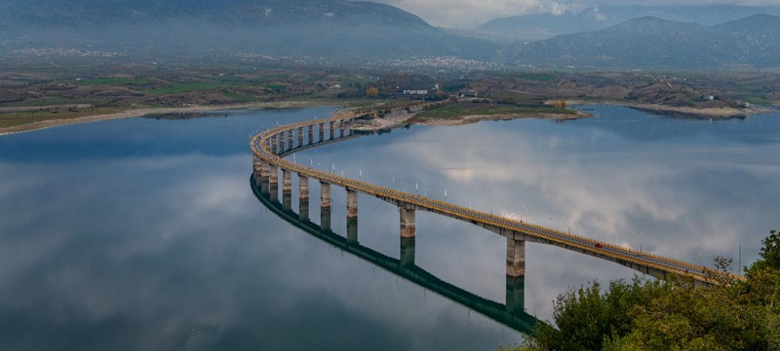
Photo provided by Argiris Karamouzas
29
Apr 21
Mini-Symposium has been announced in the IABMAS 2022, Barcelona conference
Delivering bridges resilient to multiple natural hazards and climate change is fundamental to continued economic prosperity and social coherence. Emerging and disruptive digital technologies have the potential to enhance the climate resilience of critical infrastructure such as bridges. Nevertheless, the potential of these technologies remains largely unexploited. This Mini-Symposium will show how emerging digital technologies, data and evidence will lead to more resilient bridges, by delivering efficient and reliable decision-making, in a proactive and/or reactive manner. We welcome papers in the areas of structural health monitoring, including terrestrial and airborne systems, digital data and digital twins; data integration platforms and tools (e.g. crowdsourced data, IoT, AI) used for the purpose of bridge resilience and sustainability. With this collection of papers, we aim to promote the exchange of knowledge concerning the latest research developments and practices of digital technologies, with a focus on bridges resilience and sustainability.
more info here: https://lnkd.in/e-jNz_Z
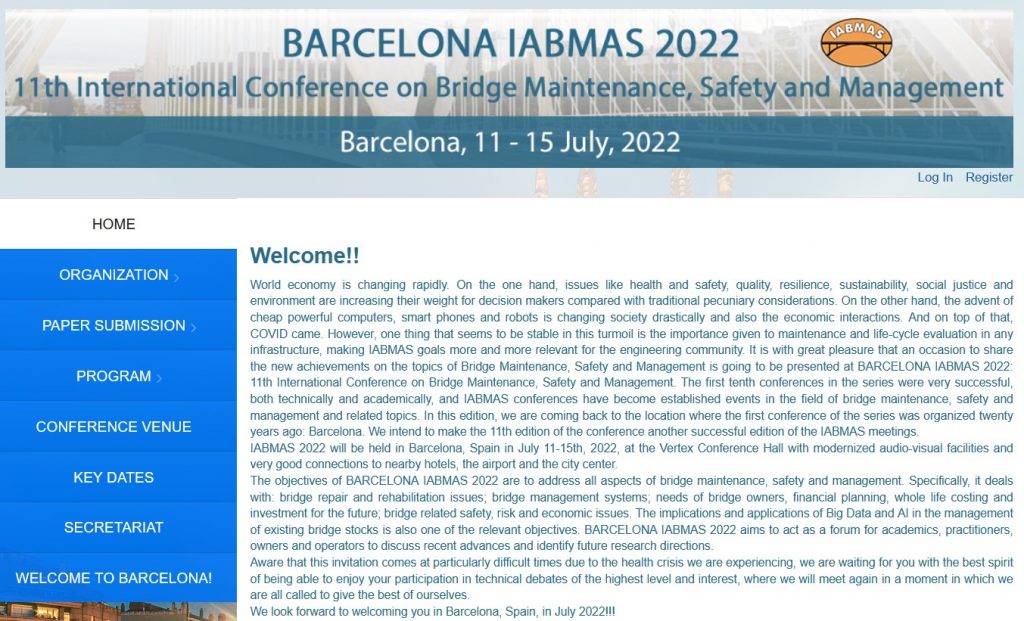
24
Apr 21
Our new paper titled “Innovations in earthquake risk reduction for resilience: recent advances and challenges
Our paper is now published in the International Journal of Disaster Risk Reduction
The Sendai Framework for Disaster Risk Reduction 2015-2030 (SFDRR) highlights the importance of scientific research, supporting the ‘availability and application of science and technology to decision making’ in disaster risk reduction (DRR). This paper summarises some of the key aspects identified and discussed during the workshop to inform other researchers worldwide and extend the conversation to a broader audience, with the ultimate aim of driving change in how seismic risk is quantified and mitigated. Read the paper here.
co-authored with Fabio Freddi, Carmine Galasso, Gemma Cremen, Andrea Dall’Asta, Luigi Di Sarno, Agathoklis Giaralis, Fernando Gutiérrez-Urzúa, Christian Málaga-Chuquitaypee, Crescenzo Petrone, Anastasios Sextos, Luis Sousai, Karim Tarbali, Enrico Tubaldi, John Wardman Gordon Woo
